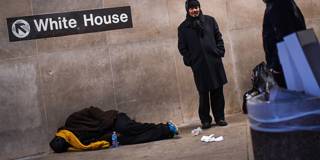In 2014, the world economy remained stuck in the same rut that it has been in since emerging from the 2008 global financial crisis. But we know how to escape our current malaise, which suggests that the big problem facing the world in 2015 is political, not economic.
NEW YORK – In 2014, the world economy remained stuck in the same rut that it has been in since emerging from the 2008 global financial crisis. Despite seemingly strong government action in Europe and the United States, both economies suffered deep and prolonged downturns. The gap between where they are and where they most likely would have been had the crisis not erupted is huge. In Europe, it increased over the course of the year.

NEW YORK – In 2014, the world economy remained stuck in the same rut that it has been in since emerging from the 2008 global financial crisis. Despite seemingly strong government action in Europe and the United States, both economies suffered deep and prolonged downturns. The gap between where they are and where they most likely would have been had the crisis not erupted is huge. In Europe, it increased over the course of the year.